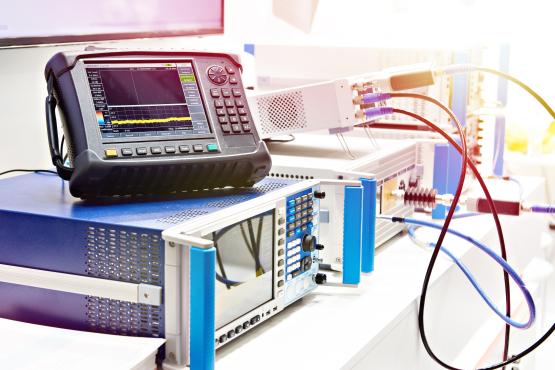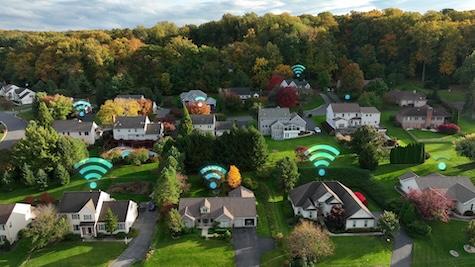5G Readiness Certification
The McClure School of Emerging Communication Technologies, in partnership with the Wireless Infrastructure Association (WIA), is offering — free of charge — the 5G Readiness certification to Ohio University students and members of the community.
This is a collaborative initiative made possible thanks to the efforts of the Scripps College of Communication, Ohio University Office for Regional Higher Education, the WIA, the Ohio Department of Higher Education, Ohio's Lt. Governor Office for Workforce Transformation, Ohio University Voinovich School of Leadership and Public Service and the McClure School.
Interested in Participating?
Why is 5G key for Ohio and the US?
5G wireless aims at delivering very high speeds to mobile and fixed users around the world. In the US, large carriers and Internet service providers are expanding their networks to provide 5G service. This expansion requires both a very large infrastructure investment and a trained workforce ready to install, configure, test, upgrade and maintain 5G networks and devices. This is particularly important for the Southeastern part of Ohio as it is among the areas in the region with the highest need for new 5G and broadband infrastructure.
What is the 5G Readiness Certification?
The 5G Readiness certification curriculum starts with foundational knowledge of wireless communications and cellular networks. It then expands on the different current technologies being deployed around the US, which include 5G, CBRS, indoor/outdor Distributed Antenna Systems and the latest generations of WiFi. The certification incorporates an overview of how these networks are built and the basic understanding needed to be involved in deploying them. It also incorporates a hands-on day where attendees will apply their knowledge and learn how to operate measurement equipment for advanced wireless systems. A full description of the curriculum is available in the "Syllabus" tabs.
Audience
The certification is open to all Ohio University students and members of the community. However, there is a limited number of seats available per cohort.
We encourage people interested in starting a career in this exciting field to get the 5G Readiness certification as a first step to enter the workforce.
Delivery method
The certification is designed to be delivered online in an asynchronous format. This provides attendees maximum scheduling flexibility to complete weekly content at their own pace. Approximately half of the content is delivered through highly interactive self guided online lessons. The remaining content is delivered through asynchronous lectures (e.g., pre-recorded) and optional live discussion sessions.
The certification also includes 7 hours of a hands-on component practical training to be delivered in person at different OHIO regional campus locations.
Cost
The certification is provided free of cost to all admitted applicants.
Cohorts
We will be offering the WIA's 5G Readiness through three cohorts:
- Summer, first cohort: July 1, 2024 through September 20, 2024 (12 weeks).
- Fall, second cohort: August 26, 2024 through December 14, 2024 (16 weeks).
- Spring, third cohort: January 13, 2025 through May 3, 2025 (16 weeks).
All three cohorts will focus on serving Ohio University students and members of the community around various regional campuses. The first cohort will focus in on the Lancaster campus and Athens areas, the second in the Southern campus and Athens areas and the last one in the Eastern campus and Athens areas.
Each cohort meets online except for the one day hands-on training. During the in person training, resources will be provided for individuals interested in pursuing a career in the field.
Deadlines for application
Summer '24: Friday, June 14, 2024
Fall '24: Friday, August 2, 2024
For credit (optional)
For the fall and spring cohorts, Ohio University students in Athens or at the regional campus can optionally take this certification as an Ohio University class for credit by registering for ITS 4930/5900 [3 credit hours] in Athens, CTCH 2900 [3 credit hours] in Lancaster, or CS 2900 [3 credit hours] in Southern and Eastern regional campuses.
Requirements
Attendees will require a computer or mobile device with Internet connectivity along with audio capabilities.
For a limited number of sections of the training, attendees are expected to have an introductory level understanding of some mathematical tools and methods taught in high school or during the first year of college education.
The certification will be awarded upon the completion of the online interactive modules and online general knowledge assessments. Students are expected to invest from 2 to 4.5 hours each week working on the learning modules and completing online assessments.
As this certification is made possible by the efforts of the Ohio Department of Higher Education and the Lt. Governor's office for Workforce Transformation, admitted applicants will be asked to volunteer general personal information to track their employment status after the completion of the certification.
How to apply
If you are interested in participating, please fill out the short application form available here.
More information
If you have questions about the certification please contact Julio Arauz at arauz@ohio.edu or via phone at (740) 593 4917.
The 5G Readiness Certification curriculum is delivered online over 12 weeks during the summer. Participants can follow at their own pace the weekly lessons and may choose to join optional live discussion sessions with the instructor.
The certification is divided into four credentials:
- Wireless Broadband Infrastructure
- 5G Ecosystem
- In-building Wireless Solutions
- 5G and Broadband Deployment
| Week | Date | Summer Cohort | |
1 | Jul/1 | Credential 1 |
|
2 | Jul/8 | Credential 1 |
|
3 | Jul/15 | Credential 2 |
|
4 | Jul/22 | Credential 2 |
|
5 | Jul/29 | Credential 3 |
|
6 | Aug/5 | Credential 3 |
|
7 | Aug/12 | Credential 3 |
|
8 | Aug/19 | Credential 3 |
|
9 | Aug/26 | Credential 4 |
|
10 | Sep/2 | Credential 4 |
|
11 | Sep/9 | Credential 4 |
|
12 | Sep/16 | Credential 4 |
|
EL = Electronic Learning, uses an online, self-guided, interactive training platform
Asynch = Content delivered via asynchronous video. Students do not need to join a live video session, but can access pre-recorded content. The pre-recorded content has a duration between 3h30min and 4 hours, divided in short 45-minute sections.
Optional live discussion: Along with pre-recorded content, the instructor will provide a 45 min-1 hour discussion session on the material for the week. Attending the live session is optional; content will also be provided as a recording for students interested in the discussion.
The optional live discussion will be held on Thursdays of the corresponding week from 7:00-8:00 p.m. EST.
The 5G Readiness Certification curriculum is delivered online over 16 weeks during the fall and spring. Participants can follow at their own pace the weekly lessons and may choose to join optional live discussion sessions with the instructor.
The certification is divided into four credentials:
- Wireless Broadband Infrastructure
- 5G Ecosystem
- In-building Wireless Solutions
- 5G and Broadband Deployment
| Week | Fall Date | Fall or Spring Cohorts | |
1 | Aug/26 | Credential 1 |
|
2 | Sep/2 | Credential 1 |
|
3 | Sep/9 | Credential 1 |
|
4 | Sep/16 | Credential 1 |
|
5 | Sep/23 | Credential 1 |
|
6 | Sep/30 | Credential 2 |
|
7 | Oct/7 | Credential 2 |
|
8 | Oct/14 | Credential 2 |
|
9 | Oct/21 | Credential 3 |
|
10 | Oct/28 | Credential 3 |
|
11 | Nov/4 | Credential 3 |
|
12 | Nov/11 | Credential 3 |
|
13 | Nov/18 | Credential 4 |
|
14 | Nov/25 | Credential 4 |
|
15 | Dec/2 | Credential 4 |
|
16 | Dec/9 | Credential 4 |
|
EL = Electronic Learning, uses an online, self-guided, interactive training platform
Asynch = Content delivered via asynchronous video. Students do not need to join a live video session, but can access pre-recorded content. The pre-recorded content has a duration of 3.5-4 hours, divided into short 45-minute sections.
Optional live discussion: Along with pre-recorded content, the instructor will provide a 45 min-1 hour discussion session on the material for the week. Attending the live session is optional; this content will also be provided as a recording for students interested in watching the discussion at a different time.
The optional live discussion will be held on a Thursday of the corresponding week (except for 14, which will be held on Tuesday, Nov. 26), from 7:00–8:00 p.m. EST.
What is 5G?
5G is a new wireless technology that enables mobile and fixed connectivity at very high speeds. In comparison with 4G technology, which you likely use in your phone every day, 5G it is capable of delivering over 10 times the throughput enabling new applications and markets.
5G in Urban and Rural Environments
5G is already providing very high throughput to mobile and fixed customers in cities and in rural areas. Regulators around the world have assigned large portions of electromagnetic spectrum for new services, enabling 5G services that can compete with fixed wired services.
5G: Making New Applications Possible
5G will finally offer the capabilities needed by new services and applications. The market is already experimenting with mobile augmented and virtual reality applications. Smart and precision agriculture, as well as other industries, can use 5G technology to create private networks that securely transmit information and sensor data. The transportation sector is also expected to use 5G to transmit large amounts of data coming from private and public vehicles and city sensors.



